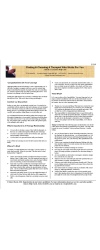Author: Robert Bacal
The Website Imperative For Small Business
Social Media Should Not Replace Your Small Business Website It’s shocking that there are so many small businesses that do not operate their own Internet web site on their own unique domain. It makes no difference what kind of business…
What You Need To Know About Using WordPress For Your Small Business
It’s A Trade off For Small Businesses Using WordPress When I search online for a service, menu or product, I often end up on WordPress sites that literally make me cringe. Many of them consist of one or two pages,…
Emotional And Verbal Abuse Isn’t Always LOUD
All too often emotional and verbal abuse leads to physical violence. Learn to recognise when you are being emotionally or verbally abused. Emotional and verbal abuse leave scars that are far deeper than the scars left by physical abuse. Learn…
Ten Tips On Using Relationship Quizzes To Understand Yourself And Your Partner
We all like to learn about ourselves and our relationships, and that’s one reason why relationship quizzes online and in magazines are so popular. Use the ones in this section for fun, and you may learn some things about yourself…
Free Chapters From ImPerfect Phrases For Relationships: 101 COMMON Things You Should Never Say To Someone Important To You… And What To Say Instead
The research on successful relationships and marriages is clear. It’s not WHAT you argue about, but what you SAY, that predicts whether your relationship will last. Sure, your tone is important, but your words and phrases make a huge difference…
Free Sample Chapters: Perfect Phrases For Customer Service (2nd Edition McGraw-Hill)
Limited Time Only Get your free 60 pages from Perfect Phrases For Customer Service, by Robert Bacal, 2nd Edition published by McGraw-Hill THE RIGHT PHRASE FOR EVERY SITUATION . . . EVERY TIME You’ve heard it a million times:…
Teachers Are From Pluto, Parents From Mercury, and It’s The Children Who Suffer
With the beginning of the school year, the “war” between parents and teachers begins anew. Both parents and teachers have the same ultimate goal: To provide the best education possible to students going to schools, which is a good thing,…
Your Shopping Choices
Welcome to the Bacal & Associates Work and Personal Development Store. Here you can find help with tons of personal and work related problems and issues. While we charge for many items you will also find some free items, which…
Should Performance Reviews Be “Fun”? One Vendor Thinks So
OK, I get that its marketing. Almost anything to grab attention. Still, I was surprised to come across the following ad on Google search results from Halogen Software, a major company that sells automation software for performance reviews. I am…
11 Simple, Yet Profound Perspectives To Make Performance Management Work
My quick guide to performance management, Making Performance Management and Appraisal VALUABLE: Walking The Path Together contains 86 tips on how to make performance management both effective and how to remove the sense of confrontation and feelings of discomfort. Here are…
Welcome to our 2024 Edition
Welcome to our 2024 version of The Bacal & Associates Personal and Work Store. It’s more than a store, since we’ll have tons of free material on all kinds of topics, both work, and personal development. As you can see,…





